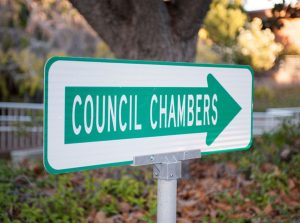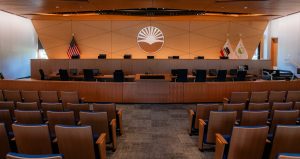The final verdict is in. Santa Clara will have to write checks for $3.16 million — $3,164,955.61, to be exact — in attorneys’ fees and $174,000 in costs for the California Voting Rights Act lawsuit the City lost last summer.
Santa Clara County Superior Court Judge Thomas Kuhnle published his final decision Tuesday afternoon. At the final hearing in the case earlier that day, Kuhnle reminded Santa Clara’s attorneys that, “litigation is very costly.”
“We’re really pleased with the decision,” said attorney Richard Konda of the Asian Law Alliance, one of the three law firms representing the plaintiffs. “This is a big victory for the voting rights of Asian Americans in Santa Clara. The judge was very careful, very thoughtful and thorough.
“We hope that the Santa Clara City Council will come to its senses and not pursue an appeal, which will be very costly for the taxpayers,” Konda continued. “There were opportunities along the way to settle this case. However, the City chose not to and to go to court. That’s why the fees are what they are.”
At Tuesday’s hearing Santa Clara’s lead defense attorney Stephen Churchwell characterized the award as “selling the City down the river.” Santa Clara has already paid his firm, Churchwell White, $844,000, according to City payment registers.
Judge Finds Fees Reasonable…
The plaintiffs originally asked for $4.4 million in fees and nearly $200,000 in costs.
Kuhnle pared that down, first to $3.3 million and then to $3.16 million after correcting some arithmetic errors.
The City contended that the fees being asked for were “excessive and unreasonable.”
“Hourly rates depend on similar types of cases,” said one of the City’s lawyers. “There are not a lot of CVRA cases.” He argued that reasonable legal hourly rates could only be based on average market rates for local lawyers — such as those of the “prestigious” San José law firm Hopkins Carley, a firm that doesn’t have a voting rights practice — because so few CVRA cases have gone to litigation.
In the next breath the City appeared to undermine its own argument that the litigation was so unusual that reasonable attorney fees couldn’t be established by comparing the $975 hourly rate of attorney Robert Rubin — the third member of the plaintiffs’ legal team — to that of attorney Kevin Shenkman in Palmdale’s CVRA case.
“Mr. Rubin was our guide and the decision-maker on the strategy pursued to win the case,” responded Morris Baller, counsel to Goldstein, Borgen, Dardarian & Ho., Rubin has been arguing CVRA cases in California for almost two decades, and civil rights and voting rights cases nationally for 40 years.
Baller also noted that the Shenkman — an intellectual property lawyer who branched out into voting rights litigation in 2011 — was “decades junior” to Rubin and himself; and further, was largely pursuing CVRA cases in small Southern California cities, a very different market from the Bay Area.
Despite the City’s allegation that the plaintiffs’ attorneys were “overstaffed” and inefficient, Kuhnle found the staffing and hours reasonable. “This was fast-moving litigation. It featured a greater percentage of work requiring specialized knowledge and expertise…[and] the case focused in trails, not pre-trial work.”
… And Fee Enhancement Justified
In its brief against the fee award, the City challenged that this award merited a multiplier — an additional factor that increases the award by a percentage because of the difficulty, uniqueness, risk undertaken in the case, or attorneys’ success in arguing it — saying that the case wasn’t “novel, complex or difficult,” and “counsel did not display extraordinary skill” in prosecuting it.
The Judge also found that, contrary to the City’s arguments, the case was indeed “novel, complex and difficult” and justified a multiplier.
However, Kuhnle reduced the multiplier from 1.8 to 1.4, and applied it only to the fees incurred before the City was found in violation of the CVRA.
The legal questions in the case “were both novel and difficult,” he wrote in his decision. “The CVRA…has clear differences from federal law and few …cases provide guidance” on applying it.
“While more than 15 years have passed” since the CVRA was enacted, Kuhnle wrote, “there are only three published cases* interpreting its provisions…None of these cases addressed issues in dispute here.
“The CVRA claims at issue here were difficult,” he continued. “They involved complicated statistical techniques …to evaluate political cohesion and the occurrence of racially polarized voting.” Further, “Litigating this case required a substantial amount of time and commitment and would have been uncompensated had the claims not been proven.”
Tuesday morning, the City nevertheless continued to dispute the justification for the multiplier, with its principal argument stated by attorney Brand Cooper‘s declaration that multipliers were appropriate for class action lawsuits (his specialty) but not for “single plaintiff” litigation “such as this case.”
Attorney Rubin replied that the question is “whether the litigation served an important public interest. The defense has argued that this is a single plaintiff case, not a class action, and a multiplier is not relevant. The importance of this litigation is about the rights of thousands.
“I can’t believe Mr. Cooper can be aware of these [CVRA] cases,” continued Rubin, “to make a statement like that. This affects the rights of tens of thousands of voters across California.”**
Measure A Campaign Not a Reimbursable Expense
Kuhnle came down on the City’s side about $50,000 spent campaigning against last year’s Measure A — the two multi-member districting plan that failed to get voter approval.
“Measure A was never litigated,” he wrote. It was not a “core litigation goal” as the plaintiffs claimed “because it was not before this court …Plaintiffs did present legal arguments related to the City’s two multimember district plans but this was after Measure A was defeated.”
However, Kuhnle did consider proper time charged for “consulting with experts regarding remedies,” “public meetings on district-based elections” required by law, and “review of federal cases on alternative voting systems.”
Case Writes Santa Clara Into CVRA History
Santa Clara will enter the history books at the fourth CVRA case to go to trial and the City that spent the second largest amount of taxpayer money fighting a CVRA lawsuit. The City was first warned that its at-large system violated voting rights laws in 2011, and again in October 2016. This lawsuit was filed in 2017.
Palmdale’s CVRA lawsuit was finally settled in 2015 after three years of litigation with that City paying $4.5 million in plaintiff’s legal bills and an estimated $1.5 million for its own attorneys.
Santa Clara has not withdrawn its appeal of Kuhnle’s verdict that the City violated voting rights laws, but so far no briefs have been filed.
If the City pursues the appeal, it will have to post an appeal bond — often more than 100 percent of the judgment — assuring that the original judgment is paid if the appeal is unsuccessful. An appeal will likely take another year, during which the legal meters will continue to run.
As of press time, City spokesperson Lenka Wright said the City of Santa Clara had no statement on the ruling.
Here is Judge Kuhnle’s final order.
* Sanchez v. Modesto (2006), Rey v. Madera Unified School District (2012) and Jauregui v Palmdale (2013).
**In Serrano v Priest (1977), the court ruled that multipliers were justified if the case “resulted in the enforcement of an important right affecting the public interest.”












0 comments